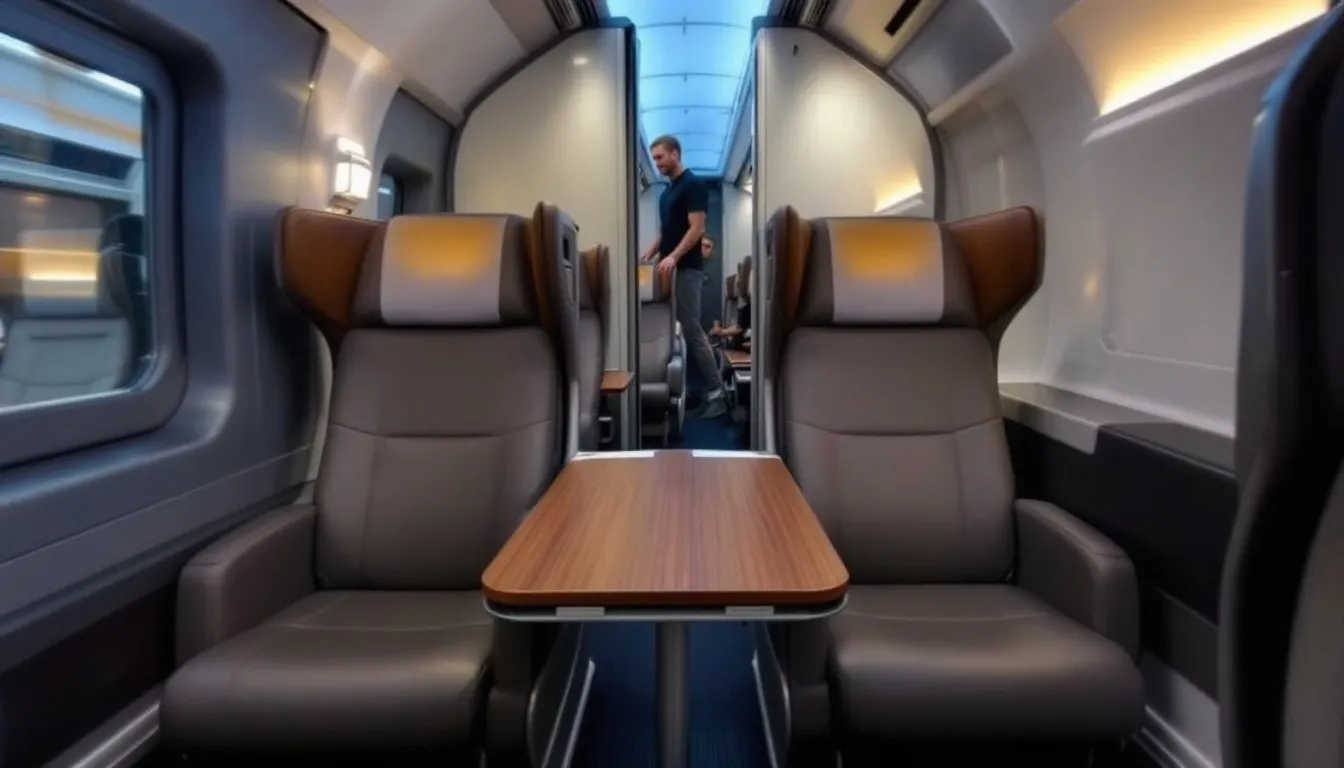Exploring Europe by train offers unmatched freedom to hop between countries, experience diverse cultures, and travel sustainably across the continent. However, choosing the best rail passes for Europe can feel overwhelming with numerous options, eligibility requirements, and pricing structures to consider.
The right rail pass can transform your European adventure from an expensive logistics nightmare into an affordable, flexible journey. Whether you’re planning to visit multiple countries or explore one nation in depth, understanding your options will help you make the smartest choice for your itinerary and budget.
This comprehensive guide breaks down everything you need to know about European rail passes, from eligibility requirements to cost analysis, helping you select the perfect pass for your trip.

Top European Rail Passes for 2025
These are the most popular and valuable rail pass options based on flexibility, coverage, and cost-effectiveness:
- Eurail Global Pass – best for non-European residents visiting multiple countries
- Interrail Global Pass – best for European residents exploring multiple countries
- Swiss Travel Pass – best single-country pass for Switzerland
- German Rail Pass – excellent value for exploring Germany extensively
- BritRail Pass – ideal for comprehensive UK train travel
- Eurail Select Pass – cost-effective for 2-4 neighboring countries
Each pass serves different travel styles and itineraries. The global passes provide maximum flexibility across 33 European countries, while single-country passes offer deeper value for focused exploration within one nation.
Eurail vs Interrail: Which Pass Do You Qualify For?
Your residency determines which pass system you can purchase, but both offer identical coverage and benefits.
Eurail Passes are exclusively for non-European residents, including travelers from:
- United States and Canada
- Australia and New Zealand
- Asia (Japan, South Korea, Singapore, etc.)
- Africa and South America
- Any country outside Europe
Interrail Passes are reserved for European residents, including:
- All EU member states
- United Kingdom citizens
- Switzerland, Norway, Iceland residents
- Anyone with official European residency status
Both pass types cover identical train networks across the same 33 participating countries. Pricing and conditions are nearly identical between both pass systems, with only minor regional variations.
When purchasing, you’ll need to provide proof of residency through passport verification or official documentation. European residents cannot buy Eurail Passes, and non-Europeans cannot purchase Interrail Passes.
Best Global Rail Passes
The Eurail Global Pass covers all 33 participating European countries, offering the ultimate flexibility for multi-country travel. This pass grants unlimited train travel across the entire European rail network, from Portugal to Poland and from Norway to Greece.
Pass Duration Options
Flexi Passes provide flexible travel days within set periods:
- 5 travel days within 1 month
- 7 travel days within 1 month
- 10 travel days within 2 months
- 15 travel days within 2 months (most popular option)
Continuous Passes offer unlimited travel on consecutive days:
- 15 days unlimited travel
- 22 days unlimited travel
- 1 month unlimited travel
- 2 months unlimited travel
- 3 months unlimited travel
Pricing and Discounts
A 15-day flexi global pass in second class costs approximately $603 USD, working out to about $40 per travel day. The three-month first class continuous pass costs around $1,323 USD for maximum freedom and comfort.
Key discounts include:
- Youth Passes (ages 12-27): Significant savings on all pass types
- Senior Discounts (60+): 10% reduction on standard adult prices
- Children 4-11: Travel free with each adult pass holder
- Group Discounts: 15% off for 2-5 adults traveling together
Both first and second class options are available. First class provides wider seats, more space, and less crowded cars, while second class offers excellent value for budget-conscious travelers.
Top Single-Country Rail Passes
Switzerland – Swiss Travel Pass
The Swiss Travel Pass stands out as the most comprehensive single-country option, though it’s not technically part of the Eurail system. This official Swiss pass covers trains, buses, boats, and city transport throughout Switzerland.
Key benefits include:
- No reservation fees or supplements required on any Swiss trains
- Free admission to over 500 museums nationwide
- Covers mountain railways and lake ferries
- Valid on urban transport in major cities
The Swiss Travel Pass often provides better value than the Eurail One Country Pass for Switzerland, especially considering the included museum admissions and complete transportation coverage.
Germany – German Rail Pass
The German Rail Pass covers all DB trains including high-speed ICE services across the extensive German rail network. Germany’s pass-friendly approach means most trains require no mandatory reservations, giving you maximum flexibility.
Available durations:
- 3-15 travel days within one month
- Excellent value for extensive German travel
- Covers regional and high speed trains equally
Other Notable Single-Country Passes
BritRail Pass serves UK travel with no reservation requirements on most services. The comprehensive coverage includes England, Scotland, and Wales, with special rates for consecutive day or flexible day options.
Renfe Spain Pass often offers better value than the Eurail Spain Pass, particularly for extensive high speed travel on AVE trains. Spain’s modernized rail network makes this pass attractive for travelers focusing on major cities.
France Rail Pass provides comprehensive access to the French train network, though reservation fees on TGV services can add up quickly. Consider this pass primarily for extensive travel beyond Paris.
Italy Rail Pass covers Trenitalia services nationwide, but high reservation fees on Frecciarossa high speed trains can diminish value. Best suited for travelers using regional trains extensively.
Pass-Friendly vs Pass-Unfriendly Countries
Understanding reservation requirements helps you budget accurately and plan effectively.
Pass-Friendly Countries (Low or No Reservation Fees)
These countries offer the best value for pass holders:
- Germany – Most trains require no reservations, maximum flexibility
- Austria – Optional reservations for €3-4 on most services
- Switzerland – No reservations needed on any trains
- Denmark – Minimal reservation requirements
- Benelux countries (Belgium, Netherlands, Luxembourg) – Mostly reservation-free travel
- Czech Republic – Low-cost optional reservations
Pass-Unfriendly Countries (High Reservation Fees)
These destinations can significantly increase your total cost:
- France – €4-20 reservation fees on TGV and intercity trains
- Italy – €10-13 fees on high speed Frecciarossa services
- Spain – €4-13 fees on AVE and long-distance trains
- Portugal – Reservation fees on Alfa Pendular services
- Sweden – €5-9 fees on SJ high speed trains
- Eurostar – €30-38 passholder fare plus limited seat availability
Cost Analysis and Value Considerations
Rail passes offer best value for flexible, extensive travel across multiple countries. However, fixed itineraries with advance booking often cost less than passes.
When Passes Make Sense
Passes provide excellent value when you:
- Visit multiple countries during your trip
- Travel spontaneously without fixed dates
- Take long-distance routes frequently
- Visit pass-friendly countries primarily
- Travel during peak season when advance tickets are expensive
When Individual Tickets Are Better
Point-to-point tickets often cost less for:
- Fixed itineraries with advance planning
- Travel primarily in Eastern Europe (lower ticket prices)
- Short trips with minimal train travel
- Routes requiring expensive reservations
Sample Cost Comparison
Consider a 2-month trip visiting Germany, Austria, Switzerland, and Italy:
With 15-day Flexi Pass ($603) plus reservations:
- Pass cost: $603
- Reservation fees: ~$100-150
- Total: ~$703-753
Individual advance tickets:
- Frankfurt-Vienna: €39
- Vienna-Zurich: €59
- Zurich-Milan: €35
- Milan-Rome: €29
- Total for major routes: ~$180
The pass makes sense if you add regional travel, spontaneous trips, or visit more destinations.
How to Choose the Right Pass for Your Trip
Follow this decision framework to select your ideal pass:
Step 1: Calculate Your Specific Itinerary
List all planned train journeys and research individual ticket prices. Factor in reservation fees for pass options. Compare total costs including all fees.
Step 2: Evaluate Your Travel Style
Choose passes if you prefer:
- Flexibility to change plans
- Spontaneous day trips
- Extensive regional exploration
- Simple budgeting with upfront costs
Choose individual tickets if you prefer:
- Fixed itinerary with advance planning
- Budget optimization
- Minimal train travel
- Short-distance regional trips
Step 3: Consider Age Discounts
Youth travelers under 28 receive substantial discounts making passes more attractive. Senior travelers over 60 get 10% off standard prices. Families with children 4-11 benefit from free child passes.
Step 4: Factor in Countries on Your Itinerary
Prioritize pass-friendly countries like Germany, Austria, and Switzerland for maximum value. Limit time in pass-unfriendly countries like France and Italy to control reservation costs.
Mobile vs Hard-Copy Passes
Modern rail passes offer both digital and physical options with distinct advantages.
Mobile Passes
Mobile passes through the Rail Planner app provide:
- Instant download after purchase
- Flexible activation dates up to 11 months after purchase
- Integration with trip planning tools
- Real-time pass management
- No shipping delays or costs
The app allows you to activate your pass the day you start traveling and integrates with reservation systems for streamlined booking.
Hard-Copy Passes
Physical passes offer:
- No battery dependency
- Traditional rail pass experience
- Backup in case of phone issues
- Fixed activation dates (less flexibility)
Hard-copy passes require advance ordering with shipping time considerations, typically 1-3 weeks for international delivery.
Essential Tips for Using European Rail Passes
Activation and Documentation
Always activate your pass before boarding your first train. Mobile passes activate instantly through the app, while hard-copy passes require validation at staffed train stations. Carry your valid passport alongside your pass – conductors verify both documents during ticket checks.
Reservation Strategy
Book seat reservations in advance for popular routes and peak travel seasons. High speed trains, night trains, and international routes typically require reservations. Use official train operator websites when possible to avoid third-party booking fees.
Understanding Coverage
Rail passes cover mainline trains operated by state railway companies within participating countries. They don’t cover urban metros, private tourist trains, or replacement bus services. Always verify that your specific train accepts rail passes before boarding.
Travel Day Management
For flexi passes, each travel day covers unlimited train travel from midnight to midnight. Plan efficiently to maximize each travel day – consider taking multiple trains on activation days to get full value.
Documentation for Hard-Copy Passes
Keep your travel diary updated with dates and train details to avoid fines. Conductors may ask to see this information during checks, particularly on international routes.
Making the Smart Choice for Your European Adventure
The best rail passes for Europe depend entirely on your specific itinerary, travel style, and budget priorities. Global passes excel for multi-country adventures and spontaneous travelers, while single-country passes offer targeted value for focused exploration.
Before making your final decision, calculate the total cost of your planned journeys including reservation fees. Consider your preference for flexibility versus fixed planning, and factor in age-based discounts that might tip the value equation.
Whether you choose a Eurail Global Pass for maximum freedom or a targeted country pass for deep exploration, the key is matching your pass to your travel plans. Start by mapping your itinerary, research individual ticket prices, and then compare against pass options to find your perfect European rail travel solution.
The freedom to explore Europe by train awaits – choose your pass wisely and embark on an unforgettable continental adventure.



